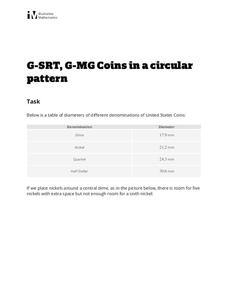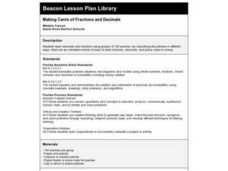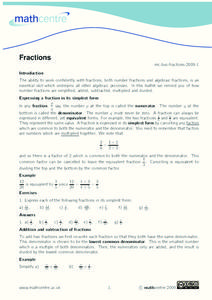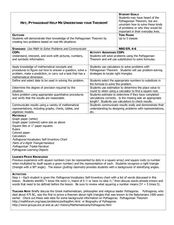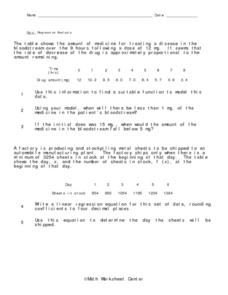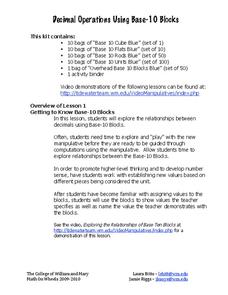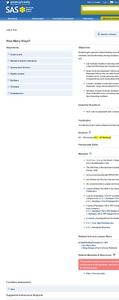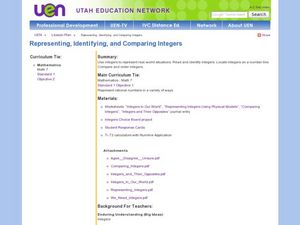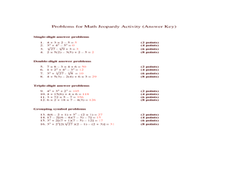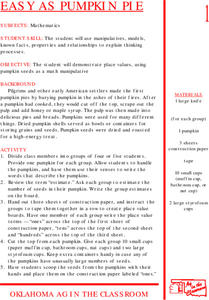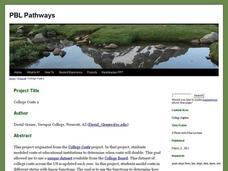Curated OER
The Barbie Bungee Drop
What do math, bungee jumping, and Barbie® have in common? Young adventure seekers use rubber bands as bungee cords to predict a thrilling, but safe, jump for their doll. First, test jumps are conducted with a few rubber bands. Then more...
Illustrative Mathematics
Coins in a Circular Pattern
What starts as a basic question of division and remainders quickly turns abstract in this question of related ratios and radii. The class works to surround a central coin with coins of the same and different values, then develops a...
Big Learning
The Antarctica Project: A Middle School Mathematics Unit
Antarctica is a big place, large enough to provide ample opportunities to learn about math. A two-week unit teaches middle school mathematics concepts using project-based learning. The resource covers functions, geometry (area,...
Curated OER
Making Cents of Fractions and Decimals
Students explore decimals and fractions using groups of 100 pennies. By classifying the pennies in different ways, there are an unlimited number of ways to learn fractions, decimals, and place value in money. This is a good, hands-on...
West Contra Costa Unified School District
Multiplying Numbers
Provide families with the guidance needed to support their child's proficiency in multiplying numbers. Three pages offer detailed descriptions and labeled examples.
California Education Partners
Summer Olympics
Quickly get to the decimal point. The last assessment in a nine-part series requires scholars to work with decimals. Pupils compare the race times of several athletes and calculate how much they have improved over time. During the second...
Charleston School District
Contextualizing Function Qualities
Let the graph tell the story! Adding context to graphs allows learners to analyze the key features of the function. They make conclusions about the situation based on the areas the graph is increasing, decreasing, or has a maximum...
Math Centre UK
Fractions
Reinforce fraction instruction with an informative worksheet equipped to provide independent practice, as well as guidance and modeling. Support is provided to boost proficiency in finding equivalent fractions, and adding,...
NTTI
Putting Together Ten
Groups explore sets of 10 items in two varieties (i.e. 3 white buttons and 7 black ones, or 5 bears and 5 bunnies). They brainstorm about their objects, write math sentences to represent what they have, and report their discoveries...
Virginia Department of Education
Mathematics Vocabulary Cards – Grade 4
An excellent way to reinforce math vocabulary in your classroom! Seventy-eight posters focus on number and number sense, computation and estimation, measurement, geometry, probability and statistics, and patterns, functions, and algebra.
Curated OER
Hey, Pythagoras! Help Me Understand Your Theorem!
Learners explore the Pythagorean Theorem. In this math lesson, pupils solve problems using the Pythagorean Theorem. They select the appropriate numbers to substitute in the formula to solve problems.
Curated OER
Regression Analysis
In this regression analysis instructional activity, 9th graders solve 10 different word problems related to regression analysis. First, they use the information given to find a suitable function to model the data. Then, students use the...
Curated OER
Spin a Window!
How many windows does this school bus have? If your class is new to counting, this will be a fun way to get them some practice. Cut out and laminate the spinner template and set it up to spin (instructions written out if you need them)....
EngageNY
Comparing Integers and Other Rational Numbers
The ninth installment of a 21-part module has pupils compare integers and rational numbers in decimal and fraction form. They match stories to number lines and compare values in the stories.
College of William and Mary
Decimal Operations Using Base 10 Blocks
Let's get this block party started and learn about decimals! Here are four main lessons that teach the operations with decimals while using base 10 blocks to provide a hands-on learning approach. Supplemental worksheets and other...
Curated OER
Scientific Notation
Students explore the concept of expressing numbers in scientific notation. In this scientific notation lesson, students understand the importance of using scientific notation by finding real world examples where scientific notation is...
Curated OER
How Many Ways?
Second graders develop number sense. In this number sense lesson plan, 2nd graders use multiple ways to represent numbers including written numerals, tally marks and manipulatives. Students correctly use place value to the thousands place.
Curated OER
Understanding number to 100
Students research equivalent representations of numbers using the base 10 system. In this Base 10 lesson, students examine place value, representations of numbers, and multiples of one, ten, and one-hundred.
Utah Education Network (UEN)
Representing, Identifying, and Comparing Integers
This resource will knock your "sox" off! It comes with so many worksheets, projects, and other attachments that help you prepare your mathematicians to see positive and negative integers in the real world, including the White Sox stadium...
EngageNY
Writing and Evaluating Expressions—Multiplication and Addition
How many people can sit around a table? The 22nd part in a series of 36 continues the work on writing and evaluating expressions to include expressions with two operations. Pupils use models to determine an expression for the number of...
Virginia Department of Education
Functions 2
Demonstrate linear and quadratic functions through contextual modeling. Young mathematicians explore both types of functions by analyzing their key features. They then relate these key features to the contextual relationship the function...
Curated OER
Solving Algebraic Equations: Algebra/Geometry Institute
Students solve problems using PEMDAS. In this algebraic equations lesson, students evaluate expressions using real number properties. They play "Math Jeopardy" to reinforce the order of operations.
Curated OER
EASY AS PUMPKIN PIE
Learners demonstrate place values using pumpkin seeds as a math manipulative. They use manipulatives, models, known facts, properties and relationships to explain thinking processes. They estimate the number of seeds in their pumpkin.
PBL Pathways
College Costs 2
What is the financial benefit for attending a community college for the first two years before transferring to a four-year college? The second part of the educational lesson asks young scholars to explore this question through data...



